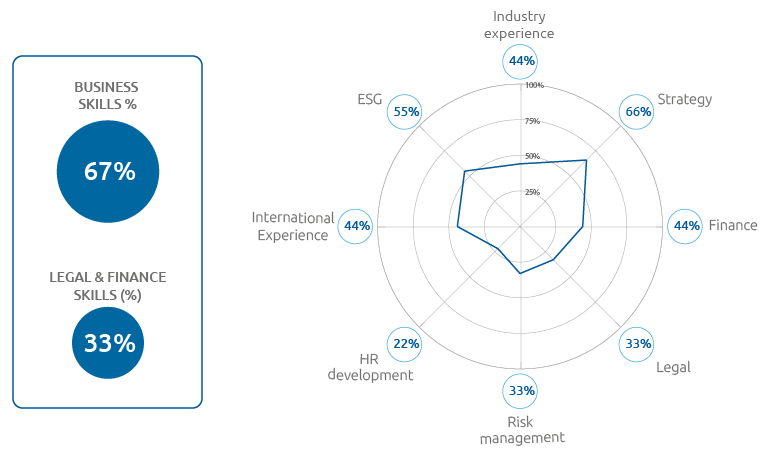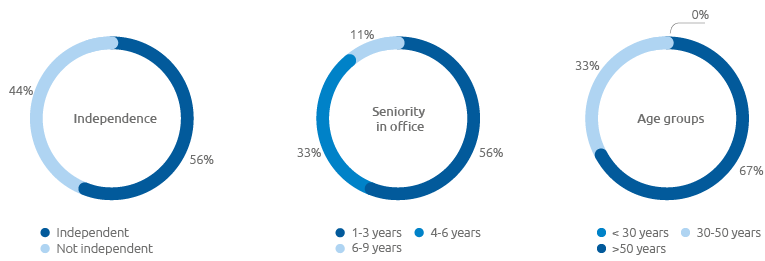The Board of Directors
The Board of Directors, consisting of nine directors, is the central body in the Corporate Governance system and is vested with the highest powers for the ordinary and extraordinary Company management. The directors currently in office were appointed by the Shareholders’ Meeting of 2 April 2019 for a period of three financial years. Presiding over the Company’s commitment to sustainable development along the value chain, as suggested by the recommendations in the new Corporate Governance Code, is one of the main tasks of the governing body. The Board is assisted, among others, by the Environmental, Social & Governance (ESG) Committee which, since May 2019, has replaced and integrated the responsibilities of the Sustainability Committee present in the company since 2016, and has propositional and advisory functions of the integration board activity of ESG issues in business strategies.
Snam has provided for the Board to participate in board induction sessions organised and conducted by the management of the relevant structures (in accordance with the recommendations of the Corporate Governance Code), during which directors and auditors obtain adequate knowledge of the business sector in which the Company operates, also in light of corporate dynamics and the evolution of the corporate structure.
The powers and characteristics of the Board of Directors
The Board of Directors of Snam is:
- Independent, with 5 out of 9 directors qualifying as independent pursuant to the Consolidated Law on Finance (TUF) and the Corporate Governance Code and the Chair qualifying as independent pursuant to the TUF;
- Representative, with one-third of the directors elected from lists submitted by minority shareholders;
- Inclusive, 33% of directors are women.




All Committees are composed of three non-executive directors, the majority of whom are independent, with the exception of the Control, Risk and Related-Party Transactions Committee, which is composed only of independent directors. With the aim of assessing the functioning of the Board of Directors and its Committees, in 2019, a Board Evaluation process entrusted to an independent advisor was launched, which expresses an opinion on the activity carried out, identifying any elements that could improve its performance, in terms of efficiency and effectiveness of its work.
Sustainability governance
The Board of Directors plays a central role in overseeing the Company’s commitment to sustainable development along the value chain and, in particular, plays a fundamental role in integrating ESG issues into the corporate strategy, such as combating climate change, reducing emissions, promoting a more efficient use of resources, and in general, in guiding Snam’s choices in the energy transition. ESG-related issues represented a substantial part of the Board of Directors’ meetings and induction sessions, which in 2020 dedicated 41% of its time to them, exceeding the expected target for the coming years set out in the ESG Scorecard (at least 40% of time until 2023).
The ESG Committee plays a key role in promoting and disseminating environmental, social and governance issues not only within the Board of Directors through board induction sessions, but also within the company itself. The Committee met 18 times, with an attendance rate of 98%, and addressed climate change issues on several occasions, analysing in particular the results and strategies implemented by Snam to combat it. They also discussed how to achieve the decarbonisation targets set by the Towards Net Zero strategy, as well as activities to spread a culture of decarbonisation within the company.
In recognition of its commitment, as in 2019, in 2020 Snam was ranked among the best Italian Companies for corporate governance and integration of ESG factors (environmental, social and governance) in corporate strategies according to the annual Integrated Governance Index survey carried out by ETicaNews and TopLegal. Finally, further recognition of Snam’s transparency and commitment to sustainable practices at global level was obtained at the beginning of 2021, when the Group was included among the world’s most sustainable companies in the Seal Sustainability Awards 2020.
For more information see the chapter “Governance” in the 2020 Annual Report.
| Download XLS (12 kB) |
|
Previous mandate |
Current mandate |
FTSE MIB Average |
||||||||||
|---|---|---|---|---|---|---|---|---|---|---|---|---|---|
Number of directors |
9 |
9 |
12.2 ** |
||||||||||
Directors elected by the minority |
3 (33.3%) |
3 (33.3%) |
2.4 (19.6%) ** |
||||||||||
Less-represented gender on the BoD |
33.3% |
33.3% |
36.6%***° |
||||||||||
Independent Directors |
66.6% |
66.6%**** |
59.8%** |
||||||||||
Average age of directors |
54 |
53 |
57**° |
||||||||||
Chair – CEO or Chair – controlling shareholder |
Non-executive |
Non-executive |
9%** |
||||||||||
Existence of Lead Independent Director |
No |
No |
22%*° |
||||||||||
|
|||||||||||||